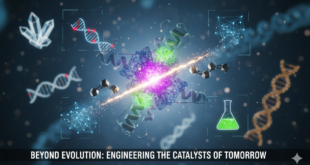Biotechnology is technology that uses biological systems, living organisms, or derivatives thereof, to make or modify products or processes for commercial application or benefit to humanity. This technology utilizes varied biomolecular and cellular procedures in order to develop products and technologies that ultimately assist in advancing human lives as well as the health of our planet. Biotechnology is an innovative, interdisciplinary field that impacts many different sectors, including agriculture, veterinary, medicine, pharmaceutical and fine chemicals production.
Some applications of biotechnology include developing food products, biochemicals, beverages, and pharmaceuticals, as well as services like using genetically altered organisms for water purification, waste management, and sustainable resource procurement. Operators in the Global Biotechnology industry primarily use living organisms or molecular and cellular techniques to develop products that are used in agriculture, food, industrial and medicine production.
Biotechnology services modify living microorganisms to provide biotechnology products on a contract or custom basis to medical, pharmaceutical, and scientific laboratories. These biotech companies may specialize in either monoclonal or polyclonal antibody development, or provide a full range of biotechnology services. Monoclonal antibody development is used in the development of assay reagents for drug discovery. By identifying important genetic biomarkers, pharmaceutical companies can develop products for therapeutic applications more quickly. Polyclonal antibody production services are also used by pharmaceutical and diagnostic companies. Biotechnology companies that perform monoclonal or polyclonal antibody development must comply with a range of regulatory requirements.
Some biotechnology services perform in-vitro monoclonal antibody purification. This technique involves the expansion and preservation of hybridoma cell lines in multiple vials, media preparation and quality control (QC), the regular collection and storage of supernatants, and supernatant concentration. Monoclonal antibody purification services may also specialize in the sterile filtration of the final product. There are three main antibody protocols for biotechnology services: the immunoblotting basic protocol, western blotting for chromagenic and chemiluminescent detection, and the basic ELISA protocol. ELISA, an acronym for enzyme-linked immunosorbent assay, is a laboratory test to determine the presence of the human immunodeficiency virus (HIV) in the blood.
To validate the performance of purified antibodies, biotechnology services may use several different diagnostic tools for antibody characterization. These diagnostic tools include size exclusion chromatography (SEC) and isoelectric focusing (IEF). SEC allows biotechnology services to determine an antibody’s percent purity. This technique also lets biotechnology companies calculate and differentiate various aggregated and fragmented percentages. IEF is used to determine the isoelectric point of an antibody, a value that corresponds with the antibody’s pH. By using IEF, biotechnology services can also reveals variants in the genetic material.
Biotechnology services may specialize in specific biomolecules such as recombinant proteins, vaccines, blood products, and gene therapy products. Recombinant proteins are used in the prevention and treatment of many diseases and medical conditions. Vaccines are immunogens that are administered to stimulate the body’s production of antibodies and provide immunity against a disease. Blood products are used in the donation and collection of blood. Gene therapy services insert genes into a subject’s cells and tissues to treat a disease. Some biotechnology services use this experimental technique to inactivate a mutated gene that functions improperly, or to replace an unhealthy gene with a healthy copy of one.
Biotechnology Services Global Market
The biotechnology services market consists of the sales of biotechnology services and related goods by entities (organizations, sole traders and partnerships) that engage in conducting research and experimental development in biotechnology. Only goods and services traded between entities or sold to end consumers are included.
The main types of biotechnology services are prevention and disease control, public engagement activities, health education and research, food biotechnology services, donor recruitment, tissue collection, cell processing and isolation, and research and development. Food biotechnology services encompass a diverse variety of technologies used in crops, livestock, forestry, fisheries and aquaculture, and agro-industry. They are used for a variety of purposes, including genetic improvement of plants and animals to increase yields or efficiency, characterization and conservation of genetic resources for food and agriculture, plant and animal disease diagnosis, vaccine development, and fermented food production. The various applications include pharmaceutical, biotechnological, academic, clinical trial, and healthcare sectors and are used by Clinical Research Organizations (CROs), Contract Manufacturers Organizations (CMOs), and Contract Research and Manufacturing Services (CRAMS)
The global biotechnology services market is expected to grow from $129.14 billion in 2021 to $151.10 billion in 2022 at a compound annual growth rate (CAGR) of 17.0%. Also, the market is expected to grow to $ $240,999.4 million in 2031 at a CAGR of 10.1%.
The biotechnology services market is expected to grow rapidly due to increasing lifestyle and chronic diseases. This is mainly due to unhealthy lifestyles, a growing aging population, rising inactivity and obesity. According to the World Health Organization, chronic disease prevalence is expected to rise by 57% globally by the year 2020. China and India together had about 193.4 million diabetic patients in 2019, and India is expected to have about 101 million diabetic patients by 2030. In the field of mental health, the World Health Organization predicts that one in every four people will be affected by a type of mental disorder such as depression, schizophrenia, or anxiety in the future. In response to this, national governments across the globe are rapidly increasing their medical research expenditure. The world’s population is also growing older with every passing year.
For instance, worldwide, the average life expectancy is expected to rise from 73 years to 74.1 years between 2016 and 2021. Based on this estimate, 11.5% of the world population will be over 65 years of age by 2021. Additionally, due to the increased consumption of processed foods, chronic health conditions like diabetes are expected to become more common. Therefore, increasing investment in medical research to treat chronic diseases is further driving the demand for biotechnology services.
The risk related to genetic data is anticipated to limit the growth of the biotechnology services market. The biotechnological approach of transferring specially created genes for modification in characteristics to create genetically modified organisms (GMOs) has always been considered a threat to human and environmental health. According to the report of the World Conservation Union, there are numerous environmental risks likely to occur by the use of GMOs, which include interbreeding, antibiotic resistance, impact on the ecosystem, creation of new or worse viruses, competition with natural species, unpredictable and unintended effects and ethical concerns. The World Health Organization (WHO) has also set guidelines for manufacturers of GMO food. The National Bioengineered Food Disclosure Standard has been implemented in the USA from January 2020 making it mandatory to label all foods containing genetically engineered items to be labeled as “”bioengineered””. Thus, the risk associated with genetically modified items is negatively impacting the growth of the biotechnology services market.
Market Segments
The global biotechnology services market segmentation is categorized by service into prevention and disease control, public engagement activities, health education and research, food biotechnology services, donor recruitment, tissue collection, cell processing and isolation, research and development; by industry into Clinical Research Organizations (CROs), Contract Manufacturers Organizations (CMOs), Contract Research and Manufacturing Services (CRAMS); by area of application into pharmaceutical, biotechnological, academic, clinical trial, healthcare sectors.
The global biotechnology services market is segmented –
1) By Service: Prevention and Disease Control, Public Engagement Activities, Health Education and Research, Food Biotechnology Services, Donor Recruitment, Tissue Collection, Cell Processing and Isolation, Research and Development
2) By Industry: Clinical Research Organizations (CROs), Contract Manufacturers Organizations(CMOs), Contract Research and Manufacturing Services (CRAMS). The contract manufacturers organizations (CMOs) was the largest segment of the biotechnology services market, accounting for $36,302.7 million or 39.2% of the total market in 2021. It is also expected to be the second fastest-growing segment going forward at a CAGR of 9.2% during 2021-2026.
3) By Area of Application: Pharmaceutical, Biotechnological, Academic, Clinical Trial, Healthcare Sectors. The pharmaceuticals was the largest segment of the biotechnology services market, accounting for $37,024.3 million or 40.0% of the total market in 2021. It is also expected to be the third fastest-growing segment going forward at a CAGR of 10.0% during 2021-2026.
Opportunities in The Biotechnology Services Market
The top opportunities in the biotechnology services market segmented by service will arise in the research and development segment, which will gain $28,527.8 million of global annual sales by 2026. The top opportunities in the biotechnology services market segmented by industry will arise in the Clinical Research Organizations (CROs) segment, which will gain $22,065.5 million of global annual sales by 2026. The top opportunities in the biotechnology services market segmented by area of application will arise in the pharmaceuticals segment, which will gain $22,641.5 million of global annual sales by 2026. The biotechnology services market size will gain the most in China at $15,678.6 million.
Geographical
Asia Pacific was the largest region in the biotechnology services market in 2021. It was followed by North America, Western Europe, and the other regions. Going forward, the fastest growing regions in the biotechnology services market will be Asia Pacific, and Middle East, where growth will be at CAGRs of 11.7% and 11.3% respectively from 2021-2026.
Industry
Major players in the biotechnology services market are Novartis, Fisher BioService, Pfizer, Novo Nordisk, BioAlps, Precision for Medicine, Sartorius and Aldevron.
Collaborations and partnerships between industry players are a growing trend in the field of biotech services. In Dec 2019, Interpace Pharma, a subsidiary of Interpace Biosciences, dealing in pharmacogenomics testing, genotyping and biorepository services, collaborated with Genecast Biotechnology Co. Ltd for jointly developing, promoting, and offering translational studies and clinical trial solutions to the industry. This partnership is expected to benefit pharmaceutical and biotech companies to accelerate their biomarker-driven drug development and precision medicine. Genecast is a Chinese company providing a wide range of diagnostic services to pharmaceutical and biotech companies.
In October 2021, Amgen, a US-based biopharmaceutical company acquired all outstanding shares of Teneobio for a deal amount of $2.5 billion. Amgen acquired Teneobio’s bispecific and multispecific antibody technologies as part of the acquisition. These solutions complement the company’s existing antibody expertise and BiTE platform. This will aid in the discovery and advancement of novel molecules for the treatment of a wide range of illnesses in Amgen’s major treatment areas. TeneoBio is a US-based biotechnology business that specialises in the production of human heavy chain antibodies.
 International Defense Security & Technology Your trusted Source for News, Research and Analysis
International Defense Security & Technology Your trusted Source for News, Research and Analysis




